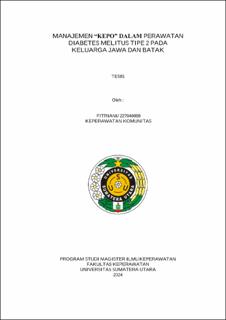Manajemen “KEPO” dalam Perawatan Diabetes Melitus Tipe 2 pada Keluarga Jawa dan Batak
Management of KEPO in the Care of Type 2 Diabetes Mellitus in Javanese and Batak Families

Date
2024Author
Fitriani, Fitriani
Advisor(s)
Nasution, Siti Zahara
Bukit, Evi Karota
Metadata
Show full item recordAbstract
Diabetes Mellitus (DM) is a chronic metabolic disorder characterized by high blood sugar levels and associated with disturbances in carbohydrate, lipid, and protein metabolism due to insulin insufficiency. KEPO management is a crucial approach to diabetes care, aiming to improve self-care, control blood sugar levels (BSL), prevent complications, and enhance the quality of life for DM patients. This family-based management includes Blood Sugar Control through Self-Monitoringof Blood Glucose (SMBG), Education on DM concepts, Medication adherence, Diet management, and Exercise through direct demonstrationsof diabetic foot exercises, body stretching, and foot care. This study aims to analyze the impact of KEPO management on self-care and blood sugar levels among DM patients in Javanese and Batakfamilies.
The research methodology used is a quasi-experimental design with a nonequivalent control group design. The population consisted of 112 respondents, divided into 56 respondents in the intervention group (28 Javanese families and 28 Batakfamilies) and 56 respondents in the control group (28 Javanese families and 28 Batakfamilies). The sample was selected using non-probability sampling, specifically consecutive sampling based on inclusion criteria. Data analysis was performed using the T-test for self-care variables and the Wilcoxon and Mann-Whitney tests for blood sugar levels.
The results of the data analysis indicated a significant difference in self-care
and blood sugar levels among DM patients in Javanese and Batak families before and after the implementation of KEPO management (p-value = 0.00/; p < 0.005). The
conclusion is that KEPO management has a significant influence on self-care and blood sugar levels among diabetes patients in Javanese and Batakfamilies.
Collections
- Master Theses [486]
